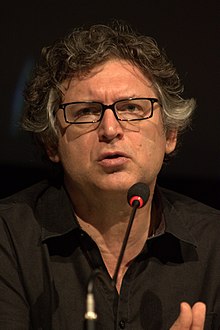Michel Onfray | |
|---|---|
 Onfray in 2012 | |
| Born | 1 January 1959 Argentan, France |
| Alma mater | University of Caen Lower Normandy |
| Era | Contemporary philosophy |
| Region | Western philosophy |
| School | Materialism Hedonism Epicureanism Atheism Consequentialism Anarchism Patriotism Mutualism |
Main interests | Atheism, religion, ethics, Cyrenaic school, hedonism, Epicureanism, pleasure, history of philosophy, materialism, aesthetics, bioethics |
Notable ideas | The principle of Gulliver (le principe de Gulliver) |
Michel Onfray (French: [miʃɛl ɔ̃fʁɛ]; born 1 January 1959) is a French writer and philosopher with a hedonistic, epicurean and atheist worldview. A highly prolific author on philosophy, he has written over 100 books.[1][2] His philosophy is mainly influenced by such thinkers as Nietzsche, Epicurus, the Cynic and Cyrenaic schools, as well as French materialism. He has gained notoriety for writing such works as Traité d'athéologie: Physique de la métaphysique (translated into English as Atheist Manifesto: The Case Against Christianity, Judaism, and Islam), Politique du rebelle: traité de résistance et d'insoumission, Physiologie de Georges Palante, portrait d'un nietzchéen de gauche, La puissance d'exister and La sculpture de soi for which he won the annual Prix Médicis in 1993.
Onfray is often regarded as being left-wing;[3][4] however, some observers have stated that he has right-wing tendencies.[5][6][7][8] He has become appreciated by some far-right circles, notably with his sovereignist magazine Front populaire.[9][10]
- ^ Ireland, Doug (Winter 2006). "Introductory Note to Onfray". New Politics. X (4). Archived from the original on 25 November 2014. Retrieved 6 April 2014.
a gifted and prolific author who, at the age of only 46, has already written 30 books
- ^ Complete list of works on the French Wikipedia page
- ^ Thillaye, Renaud (6 November 2015). "The Left Needs A Better Conversation On National Sovereignty". Social Europe. Archived from the original on 19 February 2022. Retrieved 18 February 2022.
- ^ "Michel Onfray vote pour Olivier Besancenot". L'Obs. April 4, 2007. Archived from the original on May 7, 2024. Retrieved June 15, 2017.
- ^ "Quand Michel Onfray sombre dans le conspirationnisme". Challenges (in French). 3 June 2018. Archived from the original on 16 March 2022. Retrieved 26 August 2021.
- ^ "Des intellectuels à la dérive ?". Le Monde.fr (in French). 19 September 2015. Archived from the original on 23 August 2021. Retrieved 26 August 2021.
- ^ "Onfray " en voie de zemmourisation "". France Culture (in French). 17 September 2015. Archived from the original on 23 August 2021. Retrieved 26 August 2021.
- ^ Maggiori, Robert. ""Onfray réhabilite un discours d'extrême droite"". Libération (in French). Archived from the original on 26 August 2021. Retrieved 26 August 2021.
- ^ "Avec sa nouvelle revue " Front populaire ", Michel Onfray séduit les milieux d'extrême droite". Le Monde.fr (in French). 19 May 2020. Archived from the original on 31 August 2021. Retrieved 26 August 2021.
- ^ "Débat public : un glissement de terrain à droite. Avec Philippe Corcuff". France Culture (in French). 10 March 2021. Archived from the original on 21 August 2021. Retrieved 26 August 2021.